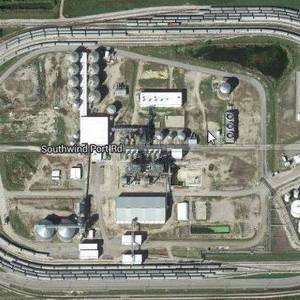Valero purchases Mount Vernon, Ind., ethanol plant from Aventine

Aventine Renewable Energy Holdings Inc.
March 21, 2014
BY Valero Energy Corp.
Valero Renewable Fuels Company LLC, a wholly owned subsidiary of Valero Energy Corp., announced March 21 that it has purchased a corn ethanol plant in Mount Vernon, Ind., from Aventine Renewable Energy-Mt. Vernon LLC, a wholly owned subsidiary of Aventine Renewable Energy Holdings Inc. The plant has an annual production capacity of 110 million gallons and uses Delta-T technology, similar to the process already in use at Valero Renewables’ ethanol plant in Jefferson, Wis.
The Mount Vernon plant is the eleventh corn ethanol plant in Valero Renewables’ system and its second in Indiana. The addition will give Valero more than 1.3 billion gallons per year in ethanol production. The plant has been shut down for approximately two years, but Valero Renewables plans to begin a restart program and resume production within the next several months.
“We’re looking forward to hiring employees, restarting the plant and producing ethanol,” said Martin Parrish, vice president of alternative energy and development at Valero. “We intend to invest in the Mount Vernon plant to make it competitive with other top-tier ethanol facilities, and we will use the technical expertise we have gained at our other plants to look at ways to improve Mount Vernon’s reliability, production rate and product yields.”
Advertisement
Advertisement
Aventine Renewable Energy Holdings CEO and President Mark Beemer states, “Aventine’s strategic divestiture of the Mount Vernon plant is an important step in revitalizing and refocusing our portfolio of ethanol assets at our Pekin, Ill., and Aurora, Nev., facilities, while also strengthening our balance sheet. Our team is successfully delivering on our aggressive turnaround strategy and is redefining Aventine as a top-tier ethanol producer.”
The Mount Vernon plant’s logistical advantages include ready access to corn suppliers as well as strong rail, truck and barge transportation. The plant is at the Port of Indiana-Mount Vernon on a location leased from Ports of Indiana, the state port authority. That relationship will continue.
“This purchase diversifies Valero Renewables’ portfolio of assets and access to markets, and it will be positive for the Mount Vernon area as well,” said Gene Edwards, who has overseen Valero’s ethanol plant acquisitions. “We look forward to a strong working relationship with Ports of Indiana, and as the other communities where we have ethanol plants have discovered, Valero is a great corporate citizen.”
Advertisement
Advertisement
Ports of Indiana CEO Rich Cooper lauded the transaction, noting that it is Valero Renewables’ first facility located at a major port on the inland waterway system.
“This facility will provide Valero with a tremendous strategic advantage in the production and distribution of ethanol,” Cooper said. “This project combines the resources and expertise of a world-class company like Valero with one of the world’s richest grain producing regions and this port’s multimodal capabilities.”
Related Stories
NREL announced the findings of the Assessment of BQ-9000 Biodiesel Properties for 2024, the eighth in a series of annual reports documenting the quality of biodiesel from U.S. and Canadian producers participating in the BQ-9000 program.
Kintetsu World Express Inc. has entered into a new agreement with Shell Aviation regarding the use of SAF. Under this agreement, KWE will adopt Shell Aviation's digital platform "Avelia" to swiftly address shippers' low-carbon transportation needs.
Aemetis Inc. released Q2 results, reporting increase revenue when compared to Q1. During an earnings call, company officials detailed progress with the company’s RNG, ethanol, biodiesel, SAF and carbon CCS projects.
Calumet Inc. on Aug. 8 confirmed its Montana Renewables biorefinery is currently running at full capacity. An initial phase of the company’s MaxSAF initiative remains on track to boost SAF capacity to up to 150 MMgy by mid-2026.
Marathon Petroleum Corp. on Aug. 5 released second quarter financial results, reporting improved EBITDA for its renewable diesel segment. The company primarily attributed the improvement to increased utilization and higher margins.
Upcoming Events










